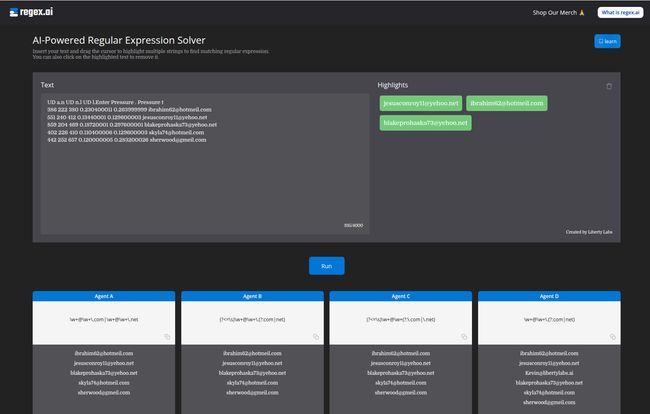There are two types of people in the tech world: those who are wizards with regular expressions, and the rest of us who stare at a string of backslashes, brackets, and cryptic characters until our eyes cross. Regex. It’s like a dark art. Incredibly powerful if you can master it, but for most, it’s a one-way ticket to a migraine and a frantic search on Stack Overflow.
I’ve been there. You've been there. We've all spent hours trying to craft the perfect pattern to extract a simple list of emails from a messy log file, only to have it fail because of a misplaced parenthesis. It's the kind of problem that makes you question your career choices. But what if there was a better way? What if you could just… tell a machine what you want, and it would conjure up the magic spell for you?
That's the promise of Regex.ai, an AI regex generator that's been making some waves. I decided to take it for a spin to see if it could really live up to the hype, or if it was just another tool that’s almost, but not quite, helpful.
So, What Exactly is Regex.ai?
At its core, Regex.ai is an AI-powered regular expression generator and solver. Created by a team called Liberty Labs, its entire purpose is to take the grunt work out of writing regex. You give it a block of text, show it what you want to pull out, and it does the heavy lifting. Think of it less as a simple tool and more as a clever assistant who actually understands what you’re trying to do. It’s designed to help you automate data extraction and, frankly, get on with your day.
This isn't just about generating code; it's about translating human intent into machine-readable patterns. A subtle but important difference.
How It Works is Almost Too Simple
When I first landed on the site, I was expecting a complex dashboard. You know the type. Buttons everywhere, confusing options, a steep learning curve. But Regex.ai is… clean. Deceptively simple, even.
The process is straightforward:
- You paste your text. This can be anything—a chunk of code, a server log, customer feedback, a list of URLs, whatever. You have a generous character limit to play with.
- You highlight the good stuff. You literally just drag your cursor over one or more examples of the data you want to extract. In the example I ran, I pasted a list of user data and highlighted a few email addresses.
- You hit 'Run.'
And then the magic happens. The tool doesn't just give you one answer. It presents you with several options from different “Agents” (A, B, C, D). Each agent offers a slightly different regex pattern that achieves the same goal. It's like getting a second, third, and fourth opinion from a panel of nerdy wizards, all at once.

Visit Regex.ai
This multi-agent approach is brilliant because, as any seasoned dev knows, there's often more than one way to write a regex. One might be more specific, while another might be more flexible. Seeing them side-by-side with the matched results is incredibly useful for picking the right one for your specific needs.
The Good, The Bad, and The Regex
No tool is perfect, right? After playing around with it for a while, I’ve got a pretty good feel for its strengths and where it stumbles. It’s not all sunshine and perfectly matched strings.
What I Genuinely Love About This Tool
The biggest win here is the sheer ease and speed. What could have been a 30-minute puzzle of trial-and-error becomes a 30-second task. For quick data extraction jobs, it feels like a superpower. Need to pull all the tracking codes from a marketing report? Done. Need to isolate all the IP addresses from an Apache log? Easy peasy. The user interface is a breath of fresh air—no clutter, no confusion.
I've always felt that the best tools are the ones that get out of your way and let you work. Regex.ai does exactly that. It doesn't try to be a Swiss Army knife; it just solves one painful problem really, really well.
The AI-powered assistance is also surprisingly intuitive. By highlighting text, you're essentially training the model on the fly, showing it what a “correct” match looks like. This is so much more natural than trying to describe the pattern in words. It's a classic case of “show, don’t tell.”
A Few Things to Keep In Mind
Okay, let's get real. The AI isn't infallible. For more complex or ambiguous patterns, it might not nail it on the first try. You might have to highlight a few more examples to give it enough context. It’s not a mind reader, but it’s a pretty good guesser.
My biggest concern, though, is a philosophical one. If you rely on a tool like this exclusively, you might never learn the fundamentals of regular expressions. And that’s a shame. Understanding regex is a valuable skill that transcends any single tool. It’s like using a calculator for all your math—super convenient, but you don't want to forget how to do long division. My advice? Use Regex.ai as a learning aid. Generate a pattern, but then take a moment to look at it and understand why it works. Use it to check your own work or to get you unstuck, not as a permanent crutch.
Who Should Be Using Regex.ai?
This tool has a surprisingly broad audience. I can see it being a lifesaver for:
- Developers: For parsing data, validating inputs, or quick find-and-replace operations in their IDE.
- Data Analysts & Scientists: Cleaning up messy datasets is half the battle. This can speed up the data wrangling process immensely. Imagine pulling specific values from thousands of rows of unstructured text.
- SEOs and Marketers: Scraping SERPs, analyzing log files for crawl data, or extracting UTM parameters from analytics exports. This is a huge time-saver.
- Students and Beginners: Anyone just starting to learn about regular expressions can use this as a reverse-engineering tool to understand how patterns are constructed.
The All-Important Question: What's the Price?
Here’s where things get interesting. As of this writing, there's no pricing page on the Regex.ai website. In fact, the link that would typically lead there seems to be broken. My guess? The tool is currently in a free, open beta or early access phase. This is pretty common for new tech products—they let people use it for free to gather feedback and work out teh kinks before putting a price tag on it. So for now, it appears to be completely free to use. I’d recommend jumping on it while you can, as that could certainly change in the future.
My Final Verdict: Is Regex.ai a Must-Have?
Look, I'm an old-school SEO guy. I believe in understanding the nuts and bolts of how things work. But I'm also a pragmatist. Time is money, and frustration is a productivity killer. Regex.ai is an exceptionally well-designed tool that solves a very real, very common pain point.
Is it going to replace a deep understanding of regular expressions? No, and it shouldn't. But is it an indispensable assistant that can save you time, reduce frustration, and even help you learn? Absolutely. For quick tasks, for getting unstuck on a tricky pattern, or for anyone who finds regex intimidating, this tool is a game-changer. It's earned a permanent spot in my bookmarks bar, right next to my favorite keyword research tools.
Frequently Asked Questions about Regex.ai
What is a regular expression, anyway?
A regular expression (or regex) is a special sequence of characters that helps you match or find other strings or sets of strings, using a specialized syntax held in a pattern. They are widely used in programming, text processing, and data validation.
Is Regex.ai free to use?
Currently, yes. As of late 2023, Regex.ai does not have a public pricing model and appears to be free to use. This may change as the tool moves out of its beta phase.
How accurate is the AI in Regex.ai?
It's very accurate for common patterns and well-structured data. For highly complex or ambiguous text, you may need to provide a few highlighted examples to guide the AI, but it generally provides several excellent options to choose from.
Can Regex.ai solve really complex regex problems?
It can handle a surprising amount of complexity. The multi-agent system often produces advanced patterns, but for extremely niche, multi-step logic, you might still need to tweak the results manually. It’s a fantastic starting point that gets you 95% of the way there.
Do I still need to learn regex if I use this tool?
I’d strongly suggest it. Using Regex.ai can actually be a great way to learn. Generate a pattern with the tool, then analyze it to understand its components. Relying on it completely may limit your growth as a developer or analyst.
What kind of data can I use with Regex.ai?
You can use almost any kind of text-based data. This includes source code (like HTML, CSS, JavaScript), log files from servers, CSV data, unstructured text from articles or reports, and much more.
Reference and Sources
- Regex.ai Official Website
- MDN Web Docs: Regular Expressions
- RegExr: An online tool to learn, build, & test Regular Expressions



